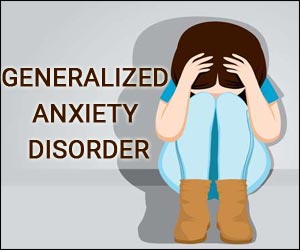- Home
- Editorial
- News
- Practice Guidelines
- Anesthesiology Guidelines
- Cancer Guidelines
- Cardiac Sciences Guidelines
- Critical Care Guidelines
- Dentistry Guidelines
- Dermatology Guidelines
- Diabetes and Endo Guidelines
- Diagnostics Guidelines
- ENT Guidelines
- Featured Practice Guidelines
- Gastroenterology Guidelines
- Geriatrics Guidelines
- Medicine Guidelines
- Nephrology Guidelines
- Neurosciences Guidelines
- Obs and Gynae Guidelines
- Ophthalmology Guidelines
- Orthopaedics Guidelines
- Paediatrics Guidelines
- Psychiatry Guidelines
- Pulmonology Guidelines
- Radiology Guidelines
- Surgery Guidelines
- Urology Guidelines
Drug Treatment of Generalized anxiety disorder-A Review

A network meta-analysis and systematic review of Pharmacological treatments for generalised anxiety disorder have appeared in the Lancet. It very vividly summarizes evidence on the efficacy of a wide array of medications in generalized anxiety disorder. The experts feel that despite the efficacy of cognitive-behavioural therapy, medications remain an important and probably preferred option for many anxious patients.
Generalized anxiety disorder is the diagnostic label given to distressing and disabling symptoms of anxiety, not due to another primary psychiatric disorder. It is a disease that can be associated with substantial dysfunction and often drives medical-care seeking in many patients. Pharmacological treatment is often the first choice for clinicians because of the cost and resource constraints of psychological alternatives, but there is a paucity of comparative information for the multiple available drug choices.
The researchers in order to document evidence of efficacy for GAD pharmacotherapy conducted a network meta-analysis of 89 randomized, controlled studies, published between 1998 and 2016, on 22 agents in 25,441 moderately anxious patients. A systematic review and network meta-analysis were performed on randomised trials in adult outpatients with generalised anxiety disorder identified from MEDLINE, Web of Science, Cochrane Library,ClinicalTrials.gov, Chinese National Knowledge Infrastructure (CNKI), Wanfang data, Drugs@FDA and commercial pharmaceutical registries. Placebo and active control trials were included. Data were extracted from all manuscripts and reports. Primary outcomes were efficacy (mean difference [MD] in a change in Hamilton Anxiety Scale Score) and acceptability (study discontinuations for any cause).
They estimated summary mean treatment differences and odds ratios using network meta-analyses with random effects. Most studies were placebo-controlled, and many used head-to-head comparisons; 18% of the studies were from China; few were conducted in seniors. Tolerability was measured by study dropout rates. The important findings are as follows-
- The strongest evidence, based on large samples, was for duloxetine, venlafaxine, escitalopram, and pregabalin.
- Based on somewhat smaller samples, mirtazapine, fluoxetine, sertraline, agomelatine, and buspirone were also effective.
- Quetiapine had the largest effect size but was less tolerated than placebo.
- Bupropion, studied in a few patients, showed efficacy.
- Paroxetine and the combined group of benzodiazepines were effective but had poor tolerability.
- Evidence of efficacy was poor for the new agents vilazodone and vortioxetine. Eliminating Chinese studies did not change the results.
Selective serotonin reuptake inhibitors and serotonin-norepinephrine reuptake inhibitors are mainstays for GAD pharmacotherapy, but study generalizability is limited by the small proportion of older patients, who have a high GAD rate.
For further reference log on to: DOI:https://doi.org/10.1016/S0140-6736(18)31793-8

Disclaimer: This site is primarily intended for healthcare professionals. Any content/information on this website does not replace the advice of medical and/or health professionals and should not be construed as medical/diagnostic advice/endorsement or prescription. Use of this site is subject to our terms of use, privacy policy, advertisement policy. © 2020 Minerva Medical Treatment Pvt Ltd